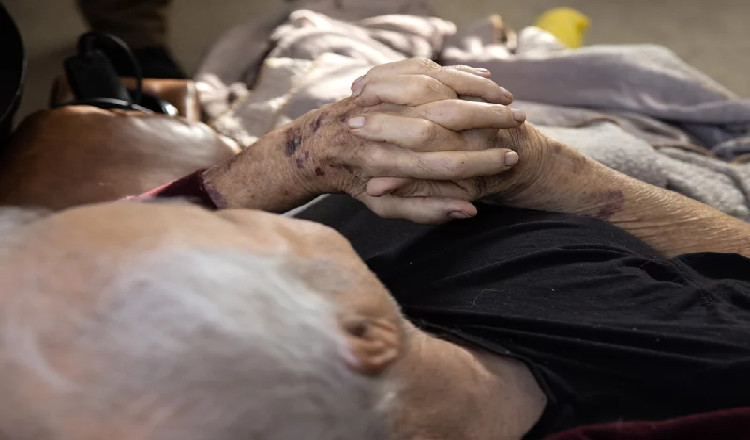
Carrie Lester eagerly anticipates her weekly Thursday phone call from her doctors' medical assistant. During the call, the assistant checks on her well-being, addresses any concerns, and offers advice on managing anxiety and other health issues. Lester attributes these conversations to helping her avoid hospital visits and reducing the need for clinic appointments to address her chronic conditions, such as depression, fibromyalgia, and hypertension. Living with her dogs, Sophie and Dolly, in Independence, Kansas, Lester finds solace in the knowledge that someone will be there to check on her regularly. With at least two-thirds of Medicare enrollees grappling with two or more chronic health conditions, federal data underscores the significance of programs like Chronic Care Management. Since its inception in 2015, this initiative has incentivized doctors to take a more proactive role in managing patients' health outside traditional office visits. Despite early findings indicating a decrease in emergency room visits, hospitalizations, and overall healthcare spending, adoption of Chronic Care Management has been slow.
As of 2019, only 4% of eligible Medicare enrollees were found to be participating in the Chronic Care Management (CCM) program, a statistic that has remained consistent through 2023, as per analysis conducted by Mathematica. In 2021, approximately 12,000 physicians billed Medicare for CCM services, based on the latest data from Medicare analyzed by KFF Health News, which includes doctors who have billed CCM services at least twelve times annually. In contrast, federal data indicates that around 1 million providers are part of the Medicare network. Despite falling short of its potential impact, numerous physicians have increased their earnings by engaging in the program, and there has been a proliferation of for-profit entities offering assistance to doctors in leveraging the program. Federal data reveals that about 4,500 physicians received at least $100,000 each in CCM payments in 2021. Under the CCM program, Medicare covers expenses related to developing patient care plans, coordinating treatment with specialists, and conducting regular check-ins with beneficiaries. Doctors receive an average monthly payment of $62 per patient for approximately 20 minutes of work per patient, as reported by companies involved in the industry. In the absence of the program, providers often lack the motivation to allocate time for care coordination since they cannot bill Medicare for such services. According to health policy experts, various factors contribute to the low participation rates in the program. One significant factor is that both doctors and patients must actively choose to participate. Doctors may face challenges in consistently monitoring patients outside of office visits due to capacity constraints. Additionally, concerns about meeting Medicare's stringent documentation requirements for reimbursement and the potential imposition of monthly copayments for patients without supplemental policies can deter participation. Kenneth Thorpe, a health policy expert at Emory University specializing in chronic diseases, emphasized the program's initial promise but criticized its implementation. He noted that many doctors' offices are not equipped for remote patient monitoring, describing the process as labor-intensive and unfamiliar to physicians who already have demanding schedules. The Chronic Care Management (CCM) program aims to broaden the scope of care available under traditional fee-for-service Medicare, aligning it more closely with the benefits offered by Medicare Advantage plans administered by private insurers. Notably, the CCM program is accessible to both Medicare and Medicare Advantage beneficiaries. One of the program's objectives was to increase compensation for primary care physicians and other healthcare providers who typically receive lower payments from Medicare compared to specialists, as highlighted by Mark Miller, a former executive director of the Medicare Payment Advisory Commission and current executive vice president at Arnold Ventures, a health policy-focused philanthropic organization. Despite the potential financial incentives, some physicians have hesitated to participate due to the upfront costs associated with the program. "While it may appear as easy income for a physician's practice, it presents challenges," noted Namirah Jamshed, a physician at UT Southwestern Medical Center in Dallas. Jamshed expressed that implementing the CCM program posed challenges for her practice, particularly in adjusting to documenting patient interactions outside of office visits and integrating this data into electronic health records. Additionally, the practice faced hurdles in hiring staff to manage patient calls before receiving reimbursement from the program. She noted that only about 10% of the practice's Medicare patients are currently enrolled in CCM. Despite offers from private companies to handle the workload, concerns regarding patient data privacy and the associated costs deterred the practice from engaging their services, especially considering that these companies can claim over half of Medicare's payments for CCM services. In contrast, physician Jennifer Bacani McKenney, who operates a family medicine practice in Fredonia, Kansas, alongside her father (where Carrie Lester is a patient), reported success with the CCM program. McKenney emphasized the positive impact of having a system in place to regularly communicate with patients, which has led to a decrease in emergency room visits, particularly among those prone to nonemergency visits due to reasons like medication shortages or loneliness. The funding from CCM allows the practice's medical assistant to make regular check-in calls with patients, a service previously unaffordable for the practice. McKenney highlighted the significant financial benefit for small practices like hers, where having a staff member generating additional revenue makes a substantial difference. Despite estimating that around 90% of their patients would qualify for the program, only about 20% are currently enrolled, partly because not everyone desires or requires regular check-in calls. While internists and family medicine practitioners have shown interest in the program, specialists such as cardiologists, urologists, and gastroenterologists have also received substantial payments through CCM, according to analysis by KFF Health News. This is noteworthy as primary care physicians are typically viewed as the primary coordinators of patient care. Since Medicare increased compensation in 2022 to $62 for 20 minutes of work and introduced additional billing codes for extended time, the CCM program has seen enhancements. To encourage patient engagement, HealthSnap ensures that caller ID displays calls as originating from the patient's doctor's office rather than the nurse's location. Additionally, the company hires nurses from various regions to better match patients' dialects, enhancing communication. According to Magid, some participants have been enrolled in the program for up to three years, and many could remain enrolled indefinitely, allowing for long-term billing to both patients and Medicare.

Delhi Sees Rise in Breathing Problems as Air Pollution Worsens
Patna: Two suspects were detained by Patna Police on Thursday for allegedly threatening a prominent orthopedic surgeon in the city and demanding money from him.
കോട്ട: വ്യാജ ഡോക്ടർ ഇൻജെക്ഷൻ വെച്ചതിനെ തുടർന്ന് രാജസ്ഥാനിലെ ബുണ്ടി ജില്ലയിൽ യുവാവ് മരണപ്പെട്ടു. സംഭവവുമായി ബന്ധപ്പെട്ട് ഈ വ്യാജ ഡോക്ടറെ പോലീസ് അറസ്റ്റ് ചെയ്തു. ജനറൽ നഴ്സിംഗ് ആൻഡ് മിഡ്വൈഫറിയിൽ ഡിപ്ലോമ മാത്രമാണ് ഇയാളുടെ ശരിക്കുമുള്ള യോഗ്യത.
New Delhi:
The government has introduced new guidelines for organ transplantation registration, eliminating the need for state domicile.
Muzaffarnagar: In a tragic incident on Wednesday evening, a speeding truck collided with a group of people at a bus stop in Uttar Pradesh’s Shamli district. The truck, believed to be carrying cement, first hit a motorcyclist, crashed into a store, and then overturned on the Delhi-Saharanpur highway.
We have various options to advertise with us including Events, Advertorials, Banners, Mailers, etc.